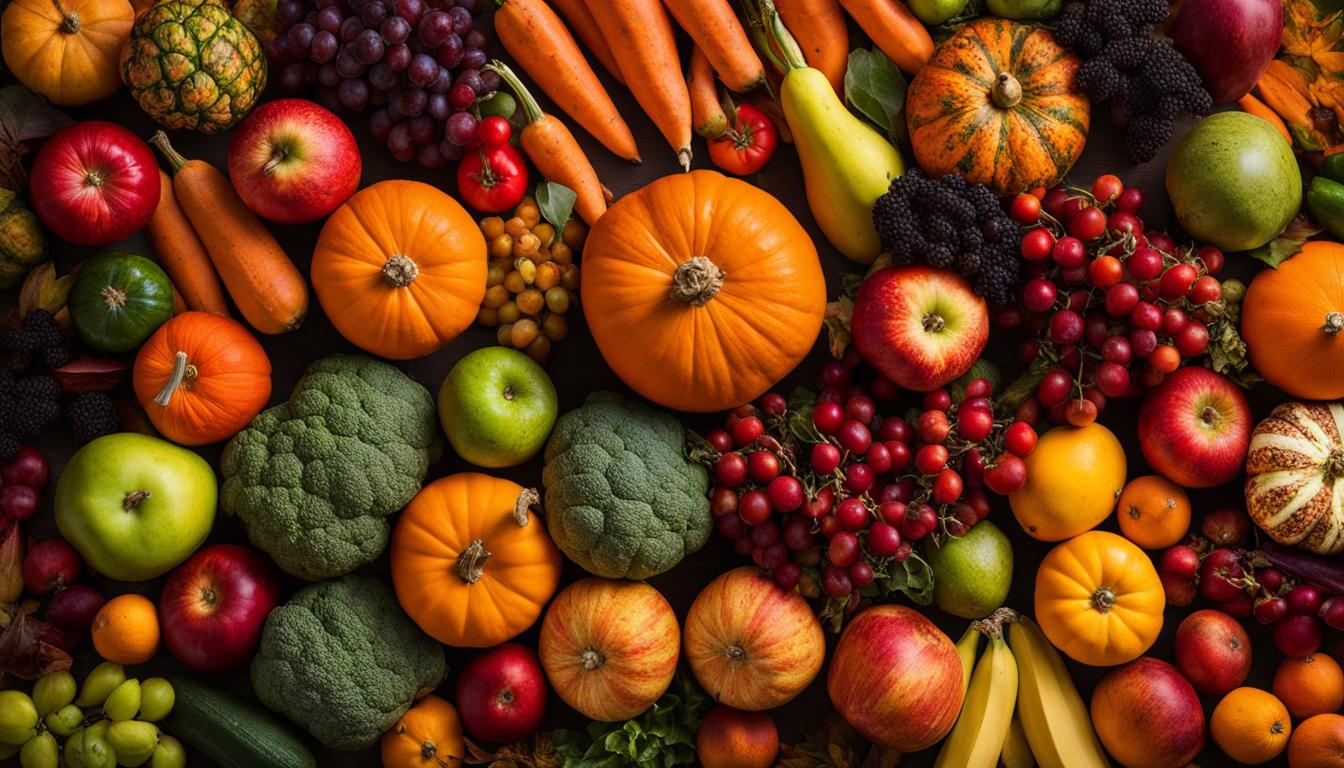When it comes to our daily food choices, eating seasonally is a simple yet powerful decision we can make. By focusing on consuming fruits and vegetables that are in season for our geographic area, we not only support our local communities but also reap numerous benefits for our health and the environment.
Seasonal eating allows us to enjoy produce at its freshest and most flavorful state. Whether it’s juicy peaches in the summer or hearty root vegetables in the winter, eating fruits and vegetables when they are in season guarantees a tastier and more satisfying dining experience.
Additionally, by opting for seasonal produce, we support local farmers and promote sustainable agriculture. Eating locally sourced food reduces the demand for out-of-season produce, which often requires extensive transportation and artificial growing conditions. By eating seasonally, we contribute to a more sustainable food system and minimize our carbon footprint.
Furthermore, incorporating seasonal food into our diet can have significant health benefits. Seasonal fruits and vegetables are picked at their peak of ripeness, ensuring optimal nutritional content. Eating seasonally allows us to consume a diverse range of nutrients and supports our body’s natural nutritional needs throughout the year.
Are you interested in embracing seasonal eating but don’t know where to start? Stay tuned for our upcoming sections, where we will delve into the benefits of eating seasonally, provide tips for incorporating seasonal produce into your meals, and explore the connection between seasonal eating and a healthier lifestyle.
Key Takeaways:
- Eating seasonally ensures fresher and more flavorful food.
- Choosing seasonal produce supports local farmers and sustainable agriculture.
- Seasonal eating provides health benefits through optimal nutritional content.
- Incorporating seasonal food into your diet contributes to a more sustainable food system.
- Stay tuned for more tips on how to eat seasonally and embrace a healthier lifestyle.
The Benefits of Eating Seasonally
Eating seasonally offers several advantages. Firstly, it saves money as in-season produce is typically less expensive. By choosing fruits and vegetables that are in abundance during a particular season, you can take advantage of lower prices and enjoy cost-effective meals. Plus, supporting local farmers and buying directly from them at farmer’s markets or through community-supported agriculture (CSAs) can often result in even more affordable options.
In addition to saving money, eating seasonally provides health benefits. Seasonal produce is picked at peak ripeness, ensuring that it is packed with nutrients. Fruits and vegetables that are harvested in their natural season often have higher vitamin and mineral content, making them a great choice for boosting your overall health. Moreover, by consuming fresh, in-season food, you can enjoy the best flavors nature has to offer.
“Eating seasonally allows you to connect with nature and appreciate the natural cycle of food,” says nutritionist Jessica Robinson. “It’s a great way to diversify your diet and try new fruits and vegetables that you may not typically eat.”
Advantages of Eating Seasonally:
- Cost-effective: In-season produce is usually more affordable.
- Nutrient-rich: Seasonal food is picked at peak ripeness, providing maximum nutritional value.
- Flavorful: In-season fruits and vegetables offer the best flavors.
- Diverse diet: Eating seasonally allows you to try new and different fruits and vegetables.
By embracing seasonal eating, you can reap the benefits of fresher, more nutritious food while supporting your local community and the environment.
Seasonal Eating and Health
Eating seasonally has a positive impact on your health. By consuming fruits and vegetables that are in season, you can provide your body with a wide range of essential nutrients. For example, during the winter and early spring, leafy greens like kale and spinach, as well as broccoli, cauliflower, and Brussels sprouts, are rich in Vitamin C, which boosts your immune system and helps fight off colds and flu.
In the summer, stone fruits like peaches and plums are abundant. These fruits are not only delicious but also provide protective carotenoids, which have antioxidant properties that promote eye health and protect against certain chronic diseases. Incorporating these seasonal foods into your diet allows you to support your body’s nutritional needs and enjoy a more balanced and varied diet.
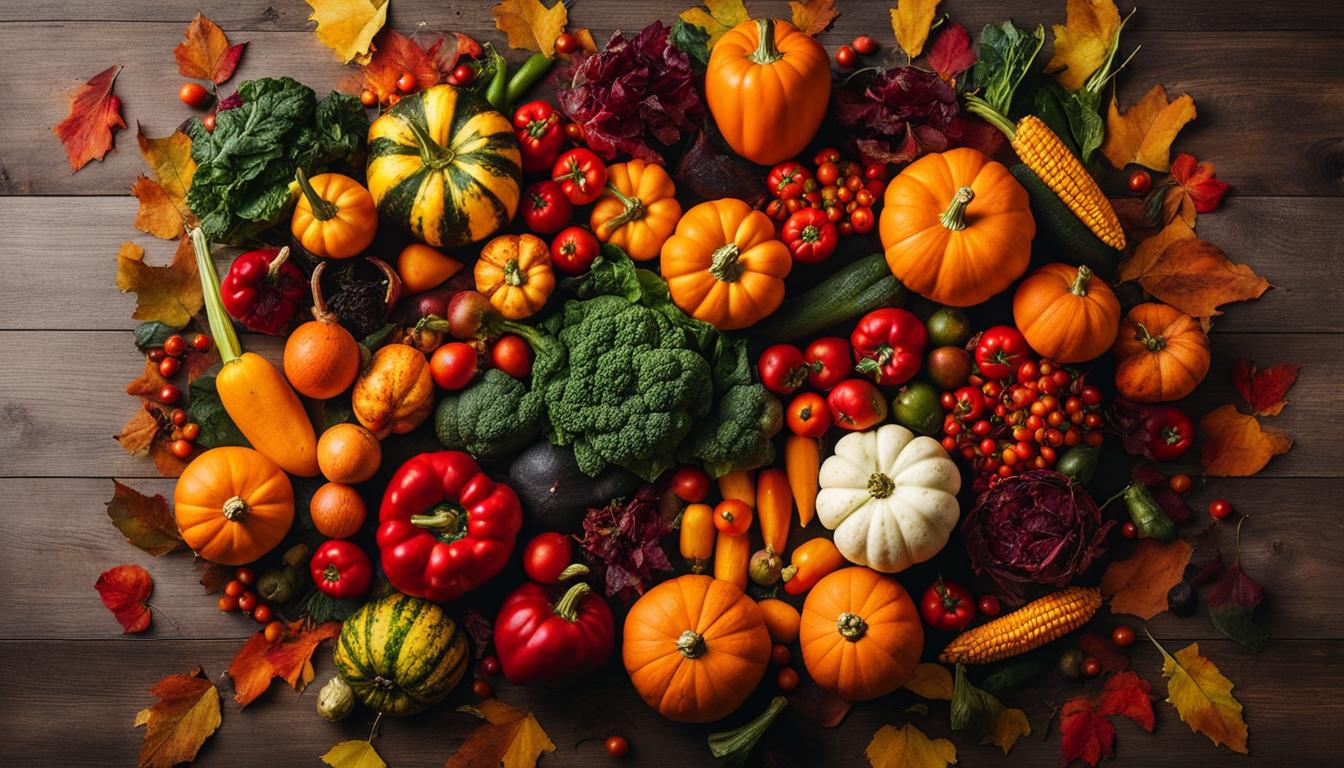
Eating seasonally also encourages a more mindful approach to your overall well-being. When you consume foods that are in sync with nature’s cycles, you develop a deeper connection with your food and gain a better understanding of where it comes from. This connection promotes a sense of appreciation for the food you eat and can enhance your overall dining experience.
Eating Seasonally: Benefits for the Environment
When it comes to sustainable eating, incorporating seasonal produce into your diet is a simple yet impactful choice. Eating seasonally not only promotes healthier living but also has significant environmental benefits. By opting for local, seasonal produce, you contribute to a more sustainable food system and reduce your environmental footprint.
Supporting Local Agriculture
One of the key aspects of seasonal eating is supporting local farmers. By choosing to eat local, you help sustain local agriculture and the farmers in your community. This not only strengthens the local economy but also helps preserve valuable farmland. Buying seasonal produce directly from farmers or visiting farmer’s markets promotes a direct connection with the people who grow your food.
“Eating seasonally reduces the demand for out-of-season produce, which requires large amounts of nonrenewable energy and water for artificial growing conditions.”
Reducing Carbon Footprint
Another significant advantage of eating seasonally is reducing the carbon footprint associated with food transportation. Out-of-season produce often requires long-distance transportation, contributing to greenhouse gas emissions and energy consumption. By consuming local, seasonal produce, you minimize the need for long-haul transportation and reduce the environmental impact of your food choices.
According to recent studies, food transport produces around 10% of global greenhouse gas emissions, making it crucial to support local, seasonal produce for a more sustainable future.
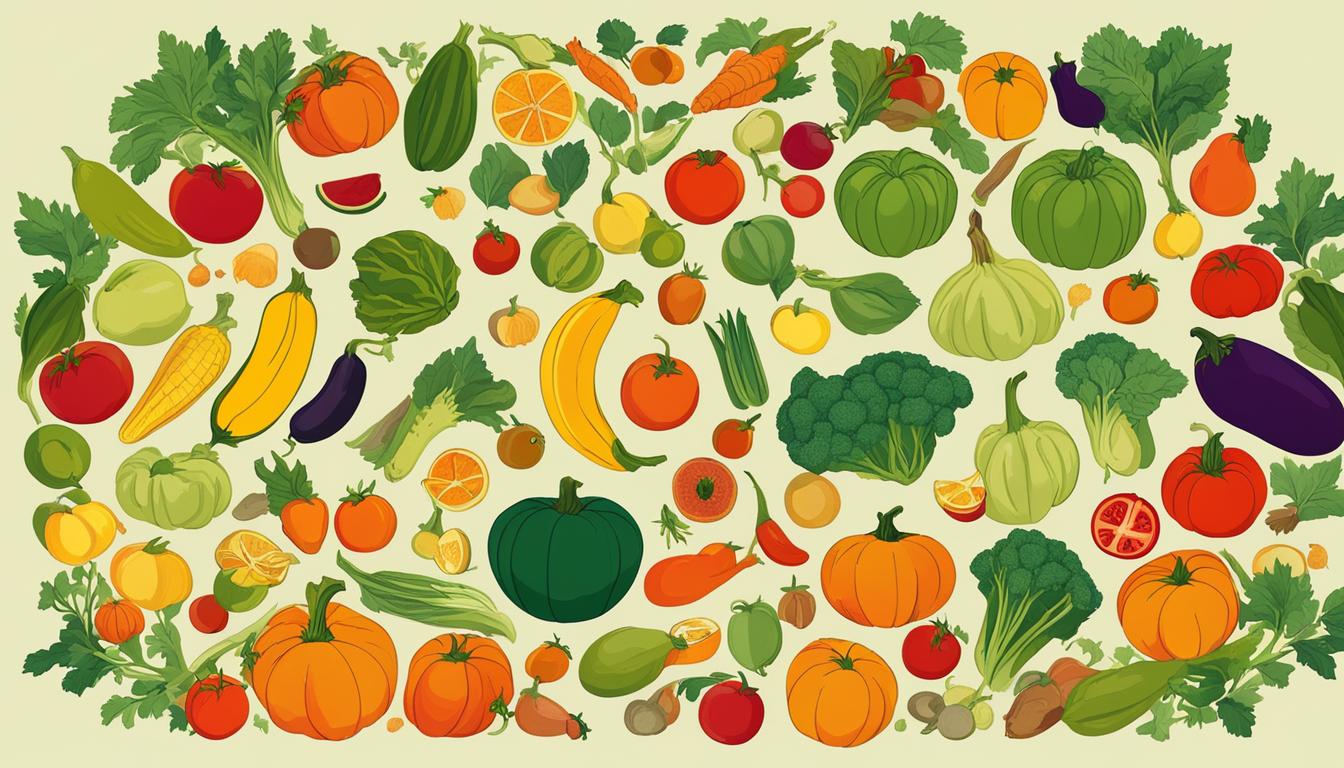
Diverse and Resilient Ecosystems
Choosing seasonal produce allows ecosystems to thrive naturally. It promotes biodiversity and the preservation of native plants and wildlife by supporting the cultivation of a wider range of crops. This diversity is essential for maintaining resilient ecosystems, as it helps combat pests and diseases without the need for harmful chemicals.
Besides, seasonal eating encourages crop rotation and regenerative agricultural practices, such as cover cropping and soil enrichment, which improve soil health and increase its capacity to retain water. These practices contribute to more sustainable farming methods and protect vital natural resources.
By embracing seasonal eating and supporting local farmers, you can play a crucial role in creating a more sustainable and environmentally friendly food system. Incorporating seasonal produce into your meals not only benefits your health but also helps protect the planet we all call home.
Seasonal Eating on a Budget
Eating seasonally doesn’t have to break the bank. In fact, it can be a budget-friendly way to enjoy fresh and nutritious meals. Here are some tips for seasonal meal planning and eating seasonally on a budget:
- Plan your meals around seasonal produce: Take advantage of the abundance of in-season fruits and vegetables by incorporating them into your meal plans. Look for recipes that feature seasonal ingredients and get creative in the kitchen.
- Buy in bulk: When you find a good deal on seasonal produce, consider buying in bulk and preserving it for later use. Freezing, dehydrating, pickling, or canning are great ways to extend the shelf life of seasonal produce, allowing you to enjoy it all year round.
- Shop at farmer’s markets: Farmer’s markets often offer competitive prices for seasonal produce. Supporting local farmers not only helps you save money but also promotes sustainable agriculture and strengthens your community.
- Compare prices: Take the time to compare prices at different grocery stores or markets. Sometimes, you may find better deals on seasonal produce at smaller, independent stores.
- Grow your own: If you have the space and resources, consider growing some of your own seasonal fruits, vegetables, or herbs. This allows you to enjoy the benefits of seasonal eating without the cost of purchasing produce.
By following these tips, you can enjoy the benefits of seasonal eating while sticking to your budget. Eating seasonally doesn’t have to be expensive; it can be a cost-effective way to nourish your body with fresh and delicious food.
Quote:
“Eating seasonally is not only a great way to support your health and the environment, but it can also be a frugal choice. By focusing on what’s in season, you can take advantage of the natural abundance and lower prices of fresh produce.” – Nutritionist Sarah Thompson

With a little planning and creativity, you can enjoy affordable seasonal food throughout the year. Incorporate seasonal produce into your meals, experiment with new recipes, and take advantage of local resources like farmer’s markets. By embracing seasonal eating on a budget, you can savor the flavors of each season while nourishing your body and supporting a sustainable food system.
Tips for Eating Seasonally
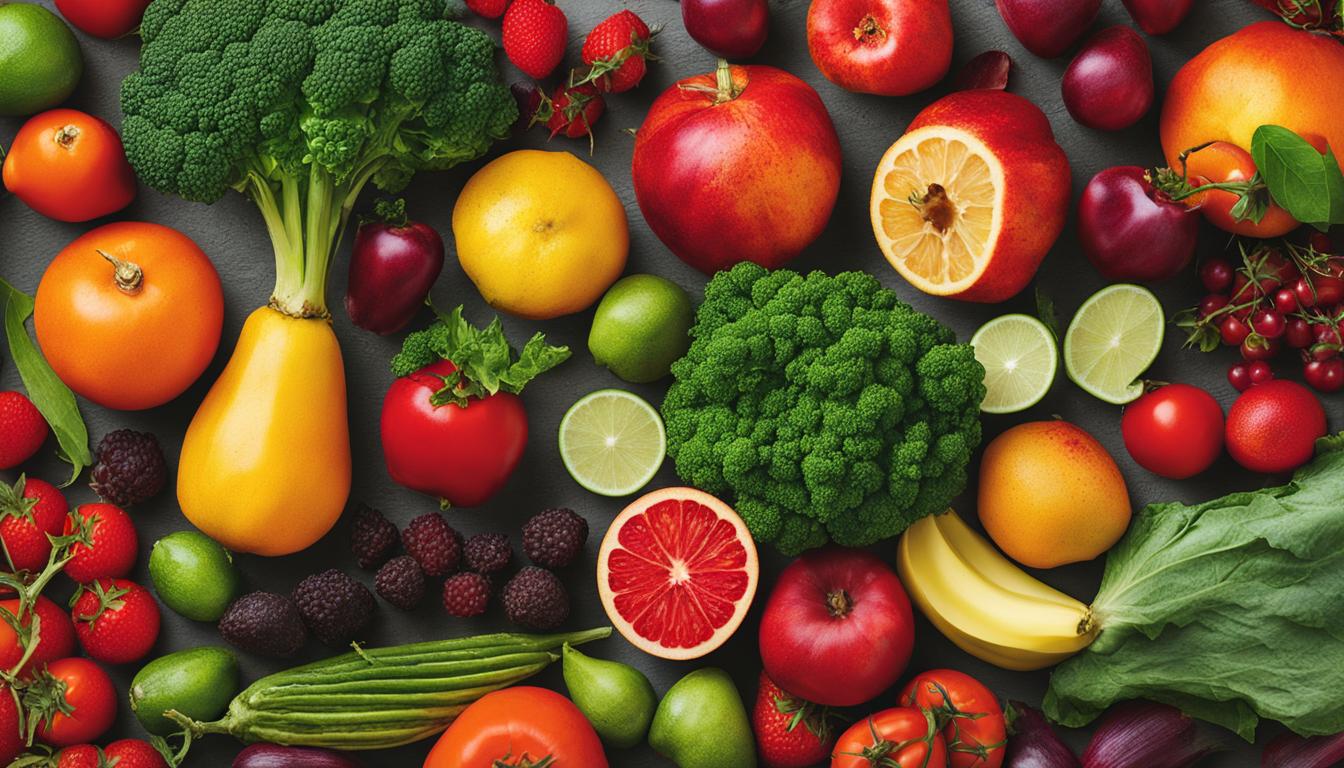
Incorporating seasonal eating into your lifestyle provides a wonderful opportunity to explore new flavors and support local farmers. Here are some tips to help you make the most of eating seasonally:
Choosing Seasonal Produce
- Research what fruits and vegetables are in season for your area. Local farmer’s markets and online resources can provide valuable information.
- Look for signs of freshness, such as vibrant colors, firmness, and a pleasant aroma. Avoid produce that is bruised, discolored, or has wilted leaves.
- Experiment with lesser-known seasonal varieties to discover unique flavors and expand your culinary horizons.
Cooking with Seasonal Ingredients
Seasonal ingredients can inspire creativity in the kitchen. Here are some ideas to get you started:
- Explore seasonal recipes and adapt them to your taste preferences. There are countless online platforms and cookbooks dedicated to seasonal cooking.
- Experiment with different cooking methods, such as roasting, grilling, or sautéing, to enhance the flavors and textures of seasonal produce.
- Consider preserving seasonal ingredients through freezing, dehydrating, pickling, or canning. This allows you to enjoy them throughout the year.
“Eating seasonally not only adds variety to your meals but also connects you to the cycles of nature and the local community.”
By following these tips, you can embrace the beauty of eating seasonally and savor the abundance of flavors nature has to offer. Let the seasons guide your culinary adventures and enjoy the benefits of fresh, nutritious food.
Supporting Local Farmers
Eating seasonally not only benefits your health and the environment but also plays a crucial role in supporting local farmers and the community. By choosing to eat local, you contribute to the livelihood of farmers and help sustain local agriculture. Farmer’s markets and community-supported agriculture (CSAs) are excellent ways to directly support local farmers and establish a connection with the food you consume.
Shopping at farmer’s markets allows you to meet the farmers who grow your food, providing a sense of transparency and trust. It’s an opportunity to ask questions about farming practices, learn more about the produce, and get recommendations for cooking. By purchasing directly from farmers, you eliminate the need for middlemen, ensuring that they receive fair compensation for their hard work.
Community-supported agriculture (CSAs) offer a unique way to support local farmers by becoming a member of a farm. By joining a CSA, you receive a weekly or monthly share of the farm’s harvest. This model provides farmers with financial stability and allows you to enjoy a variety of fresh, seasonal produce. CSAs often include lesser-known fruits and vegetables, encouraging you to expand your culinary repertoire.
Benefits of Supporting Local Farmers:
- Access to fresh, high-quality produce
- Supporting the local economy
- Promoting sustainable farming practices
- Nurturing a sense of community
When you choose to eat local and support local farmers, you make a positive impact on your community. You contribute to the preservation of agricultural land, promote sustainable farming practices, and ensure the availability of fresh, seasonal produce for future generations.
So, next time you’re planning your meals or visiting the grocery store, consider buying from local farmers. By making a simple choice to eat local, you support your community, strengthen local food systems, and enjoy the many benefits of seasonal eating.
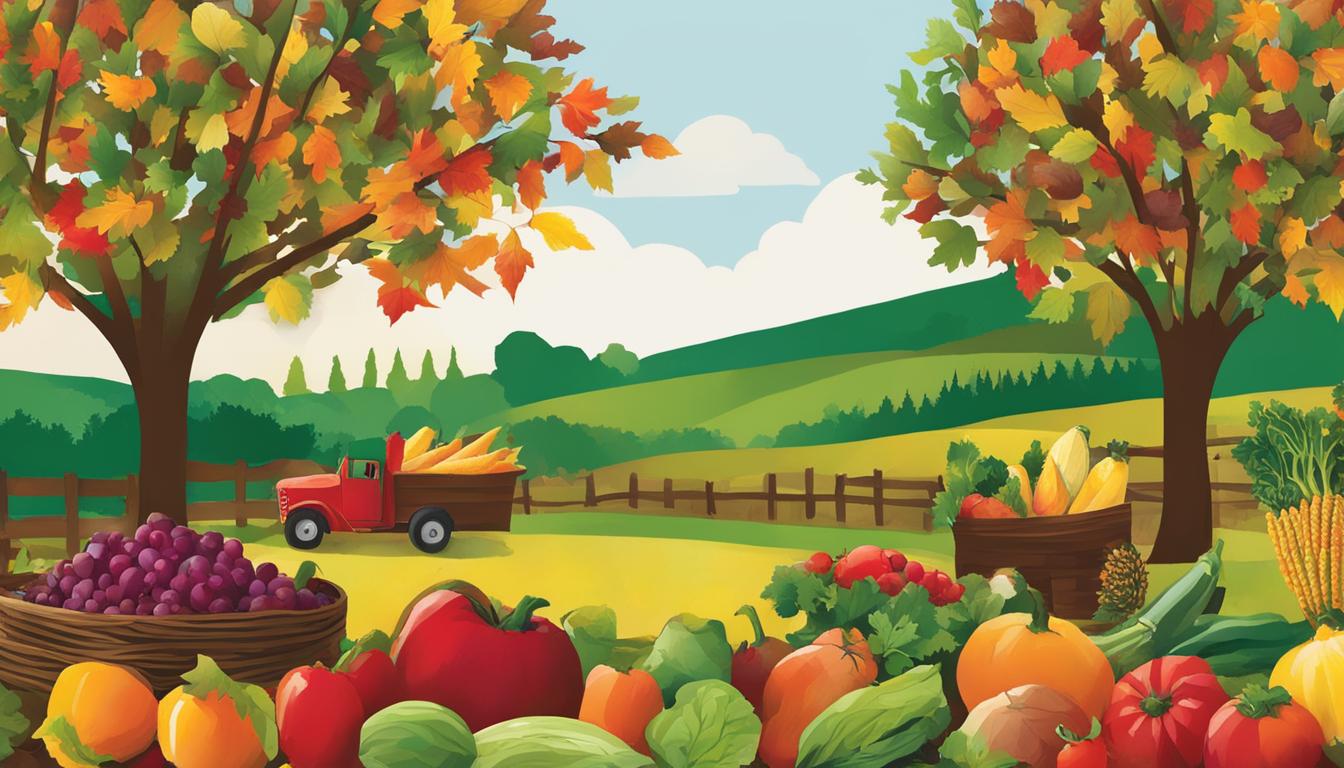
Connecting with Your Food
When it comes to seasonal eating, one of the greatest benefits is the opportunity to connect with your food on a deeper level. By knowing where your food comes from and understanding the sources behind it, you develop a more meaningful relationship with what you consume.
This connection with your food begins by getting to know your farmer. By supporting local farmers and purchasing directly from them, you not only gain access to fresh and seasonal produce but also establish a direct relationship with the people who grow your food. Visiting farmer’s markets and participating in community-supported agriculture (CSAs) are wonderful ways to meet local farmers and learn about their farming practices.
“Knowing the story of your food and the people who produce it can be incredibly fulfilling. It allows you to appreciate the hard work, dedication, and passion that goes into growing and harvesting seasonal produce.”
Understanding your food sources also means being aware of how it is produced. By choosing seasonal ingredients, you can support sustainable and environmentally-friendly farming practices. This knowledge empowers you to make informed decisions about the food you consume and align your values with your dietary choices. When you have a deeper understanding of your food, every meal becomes an opportunity to nourish both your body and your connection to the earth.

Exploring Local and Seasonal
Exploring local and seasonal food not only nurtures your body but also allows you to embrace the rich culture and diversity of your region. By trying new recipes and experimenting with different flavors, you can unleash your culinary creativity and discover unique dishes that celebrate the flavors of the season. Whether it’s incorporating heirloom tomatoes into a summer salad or savoring the warmth of roasted root vegetables in the fall, seasonal eating brings excitement and variety to your meals.
- Join a local CSA to receive a weekly share of seasonal produce directly from the farm.
- Visit farmer’s markets to connect with local farmers and discover new, seasonal fruits and vegetables.
- Research seasonal recipes to inspire your meal planning and make the most of the bountiful produce available each season.
Embracing seasonal eating fosters a sense of appreciation for the natural cycles of food and the seasons that shape them. It invites you to slow down, savor the flavors of the moment, and forge a stronger bond with the food on your plate. So, take a step towards reconnecting with your food by embracing the beauty and abundance of seasonal eating.
Cooking and Creativity
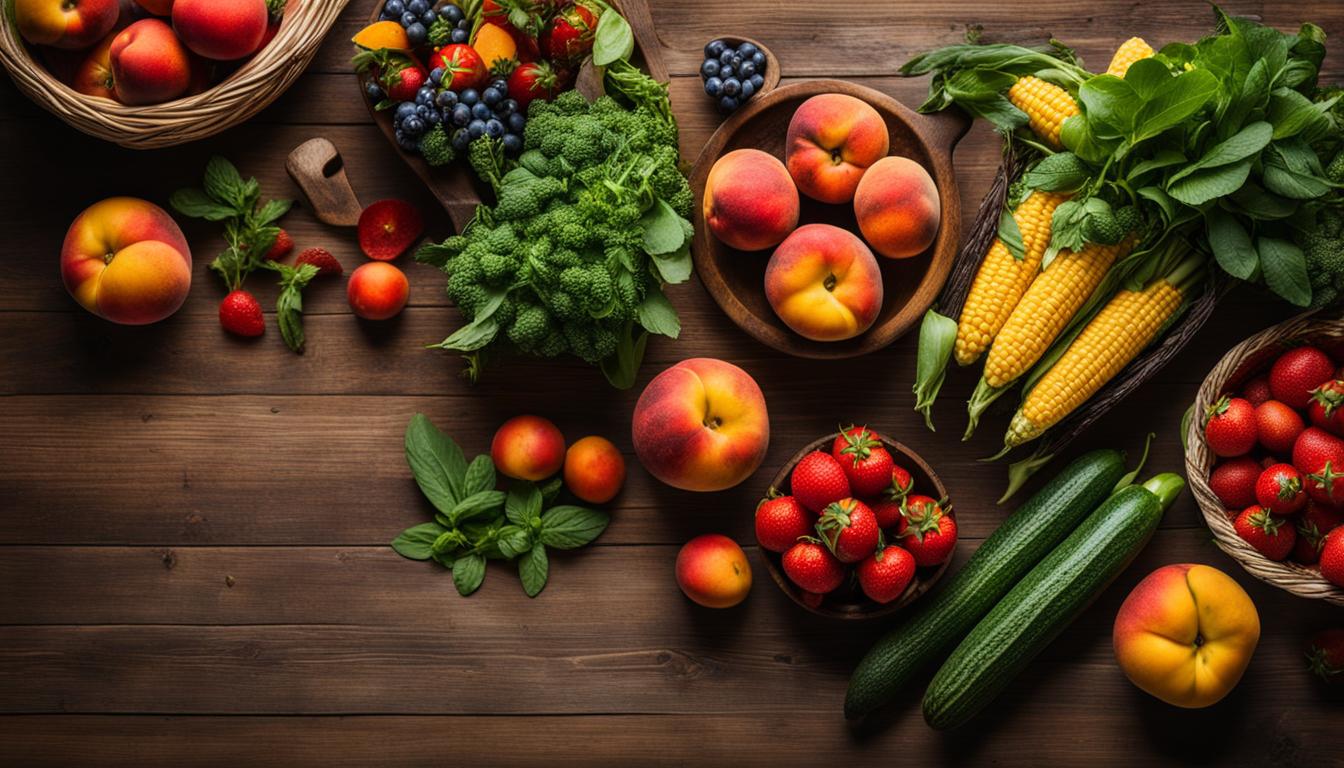
One of the exciting aspects of seasonal eating is the opportunity to explore and experiment with a wide range of seasonal recipes. The abundance of fresh, seasonal produce provides a canvas for culinary creativity, allowing you to discover new flavors, textures, and combinations.
Cooking with seasonal produce not only enhances the taste of your dishes but also gives you more control over the quality of the ingredients you use. By using local, in-season fruits and vegetables, you can ensure that your meals are packed with the highest nutritional value and optimal flavor.
Whether it’s incorporating juicy summer berries into refreshing salads or preparing cozy autumn soups with hearty root vegetables, seasonal cooking opens doors to diverse and delicious culinary experiences. The ever-changing availability of seasonal ingredients sparks inspiration and encourages you to try new recipes, creating a sense of excitement in the kitchen.
Embrace Seasonal Flavors with Creative Recipes
“In the midst of winter, I found there was, within me, an invincible summer.” – Albert Camus
Seasonal ingredients are full of character and unique flavors that can elevate your cooking to new heights. When planning your meals, consider exploring seasonal recipe websites, cookbooks, and food blogs for inspiration. Don’t be afraid to get creative and adapt recipes to suit your preferences or experiment with new flavor combinations.
- Create fresh and vibrant salads with crisp lettuce, juicy tomatoes, and tangy citrus fruits during the summer months.
- Indulge in comforting stews and roasted vegetable medleys during the cooler autumn and winter seasons.
- Prepare light and refreshing fruit-based desserts using seasonal berries and stone fruits.
- Experiment with flavorful sauces, dressings, and marinades using herbs and spices that are in season.
By embracing seasonal flavors and experimenting with creative recipes, you can make your meals more exciting, nutritious, and memorable.
Considering Food Quality and Nutrition
Eating seasonally not only provides access to fresh and flavorful produce but also offers higher nutritional value and better quality compared to out-of-season options. Seasonal food is grown during its natural timeframe, allowing it to thrive without the need for harmful additives or modifications. By consuming seasonal produce, you can ensure that you’re getting the maximum nutritional benefits from your meals.
Seasonal fruits and vegetables are picked at the peak of ripeness, ensuring that they are packed with essential vitamins, minerals, and antioxidants. These nutrients play a crucial role in supporting our overall health and well-being. Additionally, seasonal food is often grown locally, reducing the transportation time and distance, which further preserves its quality and nutritional content.
When you choose to eat seasonally, you’re not only prioritizing your health but also supporting sustainable agricultural practices. By opting for seasonal produce, you’re contributing to a more sustainable food system that promotes biodiversity, reduces carbon footprint, and supports local farmers. It’s a win-win situation for both your health and the environment.
Challenges and Considerations
While embracing seasonal eating brings many benefits, it is important to acknowledge the challenges and limitations that may arise. One of the main challenges is the accessibility of seasonal produce. In some regions, it can be difficult to find a wide variety of locally grown fruits and vegetables throughout the year. Limited availability may limit the ability to fully embrace the concept of seasonal eating.
Additionally, seasonal eating may not always be feasible for everyone due to factors such as dietary restrictions, personal preferences, or cultural traditions. It’s important to prioritize your overall health and make choices that are sustainable and suitable for your individual needs.

It is also worth noting that while eating seasonally is environmentally friendly, it may not always be the most cost-effective option. Depending on your location and the availability of local produce, in-season fruits and vegetables may be more expensive compared to imported options. This can pose a challenge for individuals on a tight budget.
Despite these challenges, incorporating seasonal eating into your diet when possible is still a meaningful step towards a more sustainable and healthy lifestyle. Even if you can’t fully commit to eating only seasonal produce, making an effort to include seasonal ingredients in your meals can still have positive impacts on your health and the environment.
Conclusion
In conclusion, embracing seasonal eating brings a multitude of benefits to your table and beyond. By choosing to enjoy fruits and vegetables that are in season, you not only save money but also savor the freshness and flavors that nature has to offer. This sustainable approach supports local farmers, strengthens communities, and contributes to a healthier environment.
Seasonal eating promotes a greater connection with your food, allowing you to understand where it comes from and how it’s produced. By engaging with farmer’s markets and community-supported agriculture, you can establish relationships with local farmers and foster a sense of community around food. Cooking with seasonal produce sparks culinary creativity, inviting you to try new recipes and experiment with diverse flavors.
When opting for seasonal ingredients, you prioritize food quality and nutrition. In-season produce is more nutritious and of higher quality, as it thrives without harmful additives and modifications. By consuming seasonal food, you ensure that your meals are packed with maximum nutritional benefits.
Although there may be challenges and limitations in accessing seasonal produce, incorporating seasonal eating into your diet whenever possible is a step toward a more sustainable and healthy lifestyle. So, make the choice to embrace seasonal eating and experience the numerous benefits it brings to your well-being, your taste buds, and our planet.
FAQ
What is seasonal eating?
Seasonal eating is a sustainable way of eating that focuses on consuming fruits and vegetables that are in season for your geographic area.
What are the benefits of eating seasonally?
Eating seasonally offers several advantages, including saving money, enjoying fresher and more flavorful food, and supporting your local community.
Why is seasonal food considered fresher and more flavorful?
Seasonal food is fresher and more flavorful because it is picked at the peak of ripeness and hasn’t traveled long distances or undergone various processes to extend its shelf life.
How does eating seasonally support my health?
Eating seasonally can have significant health benefits as you can consume fruits and vegetables that meet your body’s nutritional needs, such as Vitamin C-rich winter and early spring vegetables that boost the immune system.
How does seasonal eating contribute to the environment?
Seasonal eating is environmentally friendly as it reduces the demand for out-of-season produce, which requires large amounts of nonrenewable energy and water for artificial growing conditions. By eating locally sourced, seasonal produce, you support local agriculture and reduce transportation and refrigeration needs.
Is eating seasonally budget-friendly?
Yes, eating seasonally can be budget-friendly. In-season produce is often priced lower due to its abundance and reduced production costs. By planning your meals around seasonal foods and buying in bulk, you can save money and enjoy a variety of fresh, nutritious meals without breaking the bank.
How can I incorporate seasonal eating into my lifestyle?
To incorporate seasonal eating into your lifestyle, research what fruits and vegetables are in season for your area. Focus on trying new recipes and incorporating cool-weather produce that you may not typically eat. Consider preserving seasonal produce through freezing, dehydrating, pickling, or canning to enjoy it all year round.
How does eating seasonally support local farmers?
By shopping at farmer’s markets and participating in community-supported agriculture (CSAs), you not only get to know where your food comes from but also create a sense of community around local food production. Supporting local farmers helps ensure their livelihood and the availability of fresh, seasonal produce.
How does seasonal eating encourage a connection with food?
By knowing where your food comes from, who grows it, and how it’s produced, you gain a deeper understanding of the food system. Participating in CSAs and visiting farmer’s markets can help you establish a direct relationship with local farmers and foster a sense of community.
Does seasonal eating inspire culinary creativity?
Yes, seasonal eating often inspires culinary creativity by pushing you to try new recipes and experiment with different flavors. The variety of seasonal produce allows for diverse and delicious dishes. Cooking with seasonal ingredients also gives you more control over the quality of the ingredients and the choices you make for your health.
Is seasonal food more nutritious than out-of-season produce?
Yes, in-season produce offers higher nutritional value and better quality compared to out-of-season produce that may have been modified to grow in bulk and resist disease. When fruits and vegetables are grown during their natural timeframe, they thrive without harmful additives. By consuming seasonal food, you can ensure you’re getting the maximum nutritional benefits from your meals.
What are the challenges of eating seasonally?
While eating seasonally has many benefits, it may not always be feasible for everyone. Some regions have limited access to seasonal produce or rely heavily on imported food. It’s important to prioritize your overall health and make the best choices available to you.

